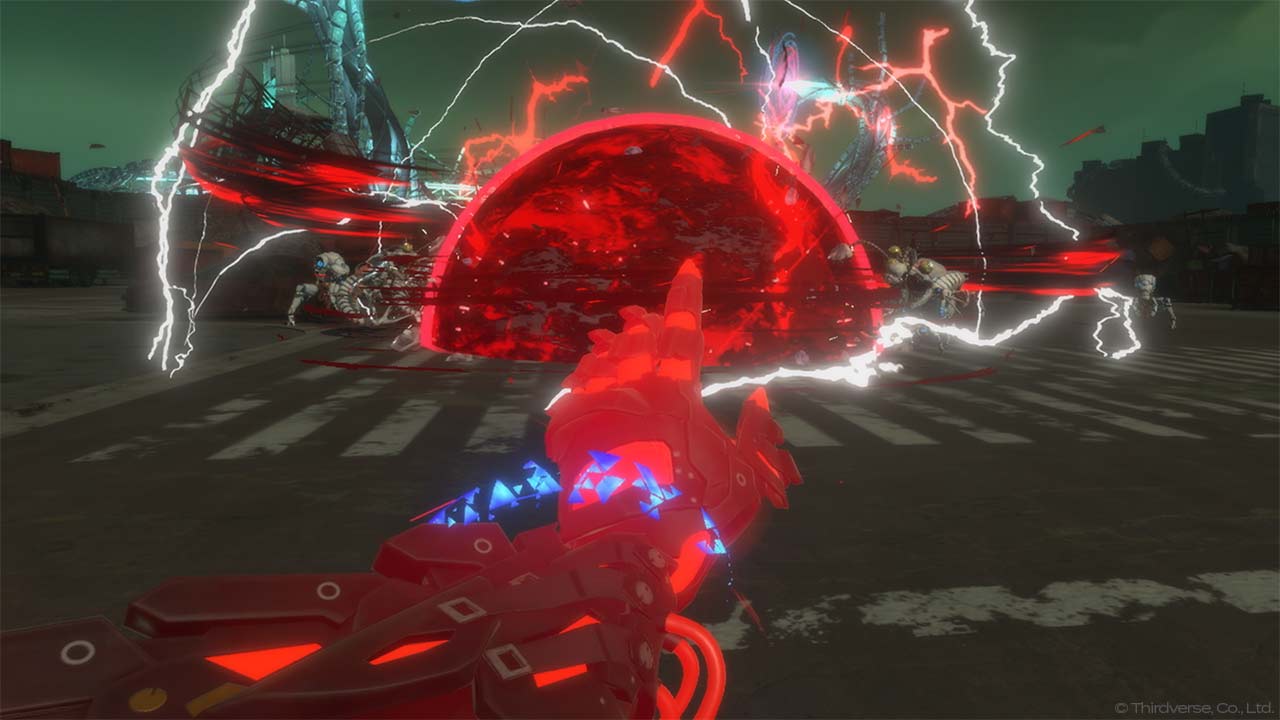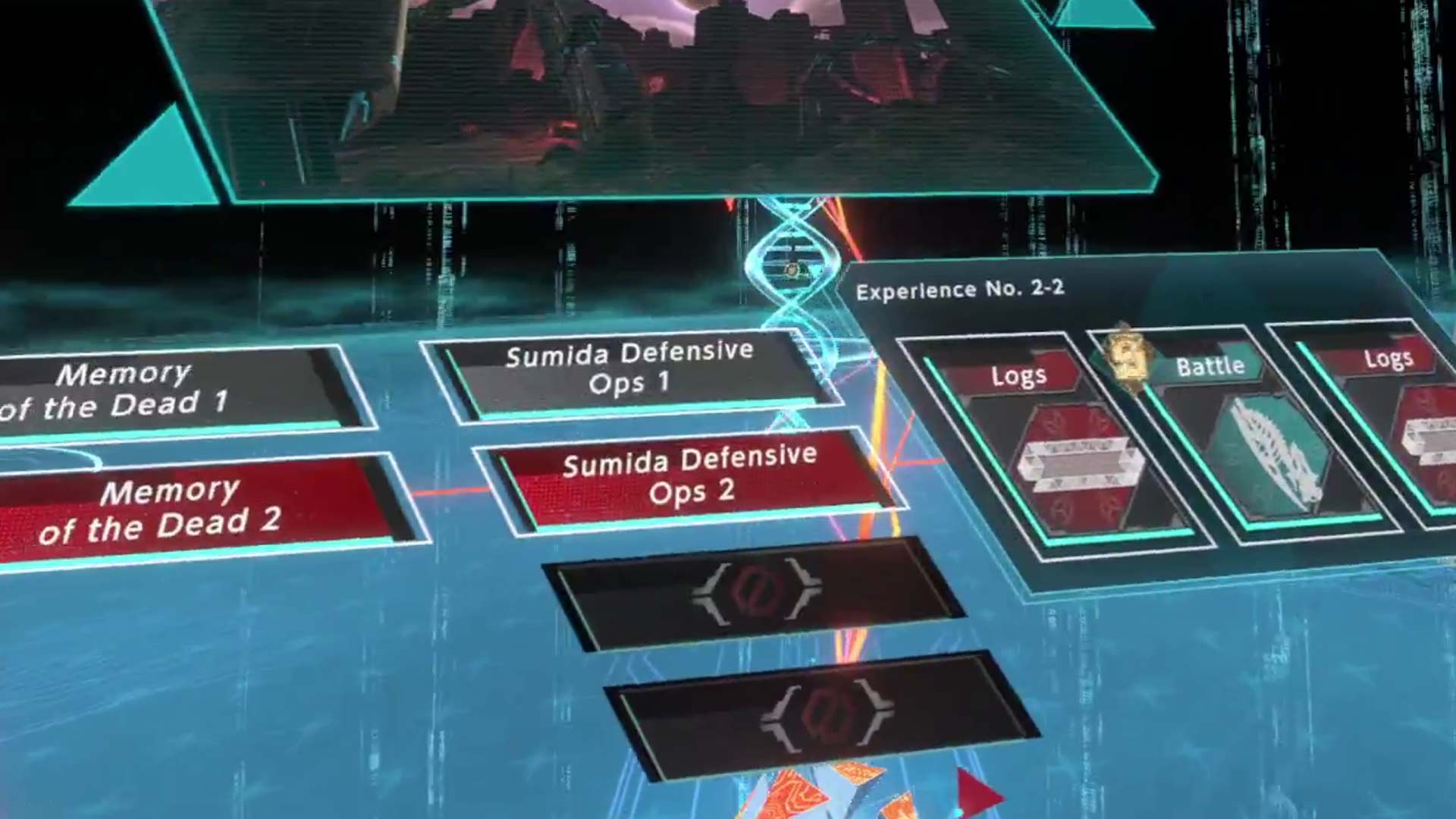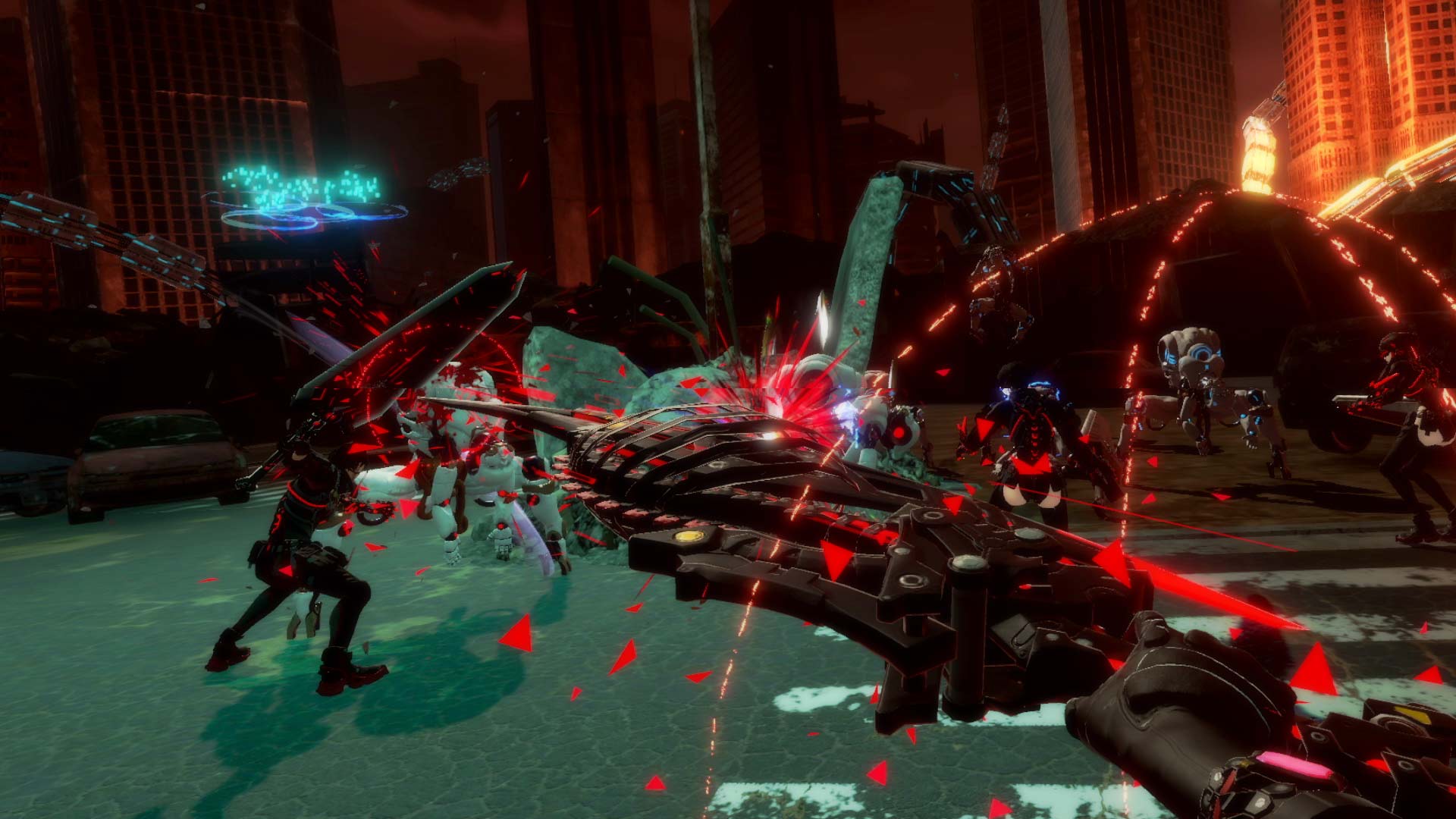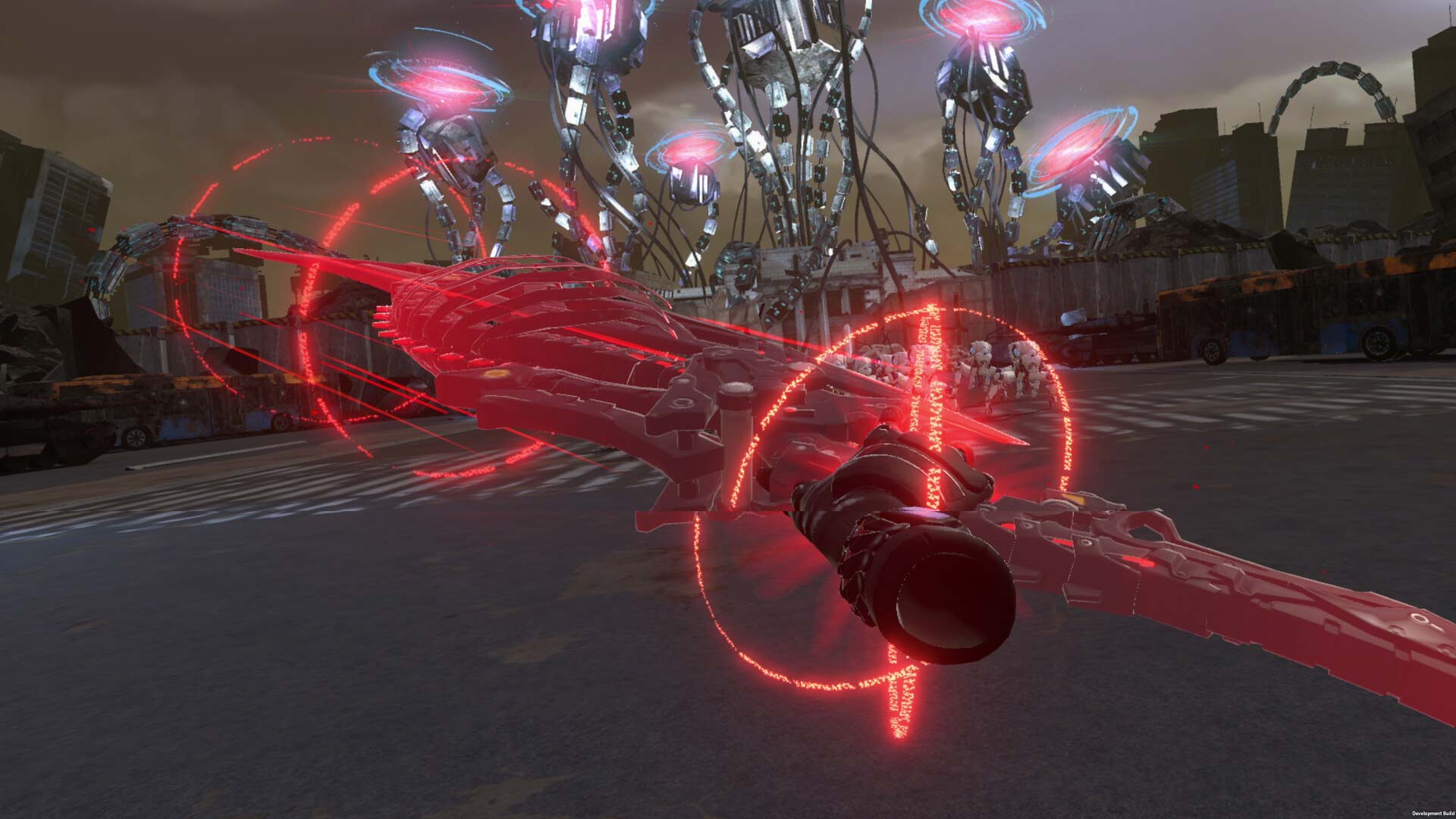SOUL COVENANT is an action RPG from the core members who brought you the SOUL SACRIFICE series. While the game does a few things to translate the franchises’s melee combat and giant monsters into a VR-native experience, adherence to the series’ repetitive wave-based missions and clunky narrative style takes it one step too many from feeling like a fresh and modern immersive experience.
SOUL COVENANT Details:
Available On: Quest 2/3/Pro, SteamVR, PSVR 2
Reviewed On: Quest 3, Quest 3 via Link
Release Date: April 18th, 2024
Price: $40 on Quest, $50 on Steam/PSVR 2
Developer: Thirdverse
Gameplay
An artificial intelligence has taken over humanity. The few humans left to oppose it fight with their lives, or in your case, with a clone-like avatar that lets you live, die, and repeat. Hosting up to four players in co-op mode, you take on the game chapter-by-chapter either alone or together to defeat the evil AI ‘Adam’, who assumes the role of a wrathful god and tosses out a ton of weird and wild bosses.
That’s about as much of the story as you’ll really need, since the game’s narrative structure and dialogue make it feel like a chore to digest, rather than something that draws you in to binge multiple missions in one sitting. And I’m not blaming it on the translation from the game’s native Japanese either, which feels like an accurate reflection of the source material. More on that in the Immersion section below.

At first, I couldn’t quite put my finger on why SOUL COVENANT left me feeling so bored. Why didn’t I want to binge this anime-inspired sci-fi fantasy, which is totally up my alley?
On paper, the game has a lot going for it. It has a cool array of giant fantasy melee weapons that are doled out as you move up the ranks through the story, a points-based upgrade system that lets you beef up both your character and your giant weapons, and it’s all set in an anime-esque world teeming with inventive and awesome-looking enemies, which are an absolute visual treat on PC, less so on Quest. After an hour or so past the tutorial level though, it was pretty clear: the tutorial never really ends, and the game never really gets any better.

Some of this comes down to SOUL COVENANT’s reliance on a system that is fairly emblematic of its overarching, obsessively-regimented structure, which leaves basically no surprises for the player to uncover.
Every level is housed in a menu folder and sub-folder designation, which contains a ‘story-combat sandwich’. You get a little story, you get a battle, then you get a little story again until the next subfolder opens up so you can rinse and repeat. Nice and neat.

While the system is helpful for teaming up with other players and allows you to seamlessly transition from the multiplayer ‘Limbo’ lobby to the action at any moment, playing through the six-hour campaign can feel overly regimented. I played mostly alone, but waited until post-launch to get in a few multiplayer sessions to see if that changed my opinion. It didn’t.
Still, all of this is layered on top of missions that feel so samey that, even if you can look past some pretty lackluster combat (more below), level objectives and maps repeat with so little variation that you begin to wonder why you’re even playing in the first place. If not for the story, then surely, the combat? Right? Right?!?

For a melee-based VR game from 2024, the nuts and bolts of the game feels painfully and unintentionally retro, essentially forcing the player to frantically wave a giant buster sword at randomly spawning waves of baddies, or at a giant boss’s highlighted weak spot with little care for tactics or even some sort of narrative payoff in the end.
Immersion
Besides its heavy-handed level structure, one of the things that could have enhanced SOUL COVENANT was its story, which makes absolutely zero effort to sweep you up to discover what’s at stake, who the characters are, and why you should care at all.
Rather, the game prefers to lay out everything logically, like you might in a Power Point presentation about a story instead of how a first-person narrative-driven experience ought to—with voiced characters that act out and reveal important plot points at unexpected and natural intervals. Cutscenes are typically just 2D images flashed in front of you, and dialogue is so painfully repetitious that you’ll pretty soon figure out where the ‘skip’ button is to get past the bland and terrible shit.

What worries me more is that may have even been the objective all along: provide such a forgettable and skippable story that you and other online players only show up for the combat missions. I would hope not, because there’s a lot of space to tell a gripping 2D, manga-style, cell-based tale if the studio wanted, but didn’t.
And I could look beyond that if it were in service of fun and immersive combat, but that simply isn’t the case. Despite their giant sizes, the game’s weapons have no weight, which effectively lets you waggle your controllers around at the equally transient enemies for what feels like undeserved results once they collapse and give you in-game currency, called ‘MONADS’.

That’s a shame, because the weapons, which are made out of the bones of your fallen comrades, look awesome, and all provide a cool secondary two-handed mode, which usually improves stuff like reach or kickback effects, offering a smartly-balanced drawback of not letting you use your free hand to activate a temporary shield.
Unfortunately the Quest version of the game has a very noticeable hit in visual quality over the PC version, both of which I tested in preparation for this review. Textures on Quest are fairly dull, and do a lot to reduce the visual richness seen on PC. This is a notable change of pace, as PC VR players are long used to games being more or less ported directly from Quest, and not the other way around.
Comfort
Besides having the ability to jump high into the air and dash around the map, SOUL COVENANT is a very comfortable game, providing a good assortment of VR comfort options to keep most people feeling at ease with the game’s constant stick-based movement.
‘SOUL COVENANT’ Comfort Settings – April 18th, 2024 |
|
Turning |
|
| Artificial turning | |
| Snap-turn | ✔ |
| Quick-turn | ✖ |
| Smooth-turn | ✖ |
Movement |
|
| Artificial movement | |
| Teleport-move | ✖ |
| Dash-move | ✔ |
| Smooth-move | ✔ |
| Blinders | ✔ |
| Head-based | ✔ |
| Controller-based | ✖ |
| Swappable movement hand | ✔ |
Posture |
|
| Standing mode | ✔ |
| Seated mode | ✔ |
| Artificial crouch | ✖ |
| Real crouch | ✖ |
Accessibility |
|
| Subtitles | ✔ |
| Languages |
Japanese, English, French, Spanish, Simplified Chinese, Traditional Chinese
|
| Dialogue audio | ✔ |
| Languages | Japanese, English |
| Adjustable difficulty | ✖ |
| Two hands required | ✔ |
| Real crouch required | ✖ |
| Hearing required | ✖ |
| Adjustable player height | ✔ |
,
